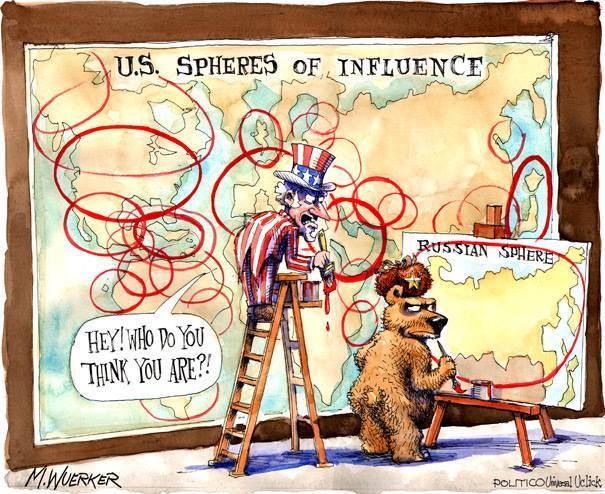(Version française)
“Russia’s goal is not to destroy Ukraine – this could be accomplished at any time. Rather, the goal of Russia is to destroy NATO by exposing its impotence.”
Scott Ritter, former U.S. military and UN nuclear inspector in Iraq
60,000 troops and more than 800 tanks, heavily supported by aircraft, attack helicopters, artillery, and missile boats, crossed the border in three areas. The purpose was to dislodge the enemy and have a sovereign, independent regime in…. Beirut. Yes, this invasion of Lebanon was on Jun. 6, 1982 and named by Israel, which carried it out, “Operation Peace for Galilee.” The Israeli occupation of its neighbor lasted until the year 2000.
Former U.S. Secretary of State Henry Kissinger defended the Israeli operation: “No sovereign state can tolerate indefinitely the buildup along its borders of a military force dedicated to its destruction” (Washington Post, June 16, 1982).
But the occupied population was Arab, and the aggressor Washington’s staunchest ally and protégé, so the world quickly lost interest in the war, just as it did when Israel invaded and captured East Jerusalem and the West Bank in 1967.
That was the outcome of a century of friction between Jews and Arabs, on a tortured land ruled for millennia by a series of imperialists, from the Romans, the Byzantines, the Early Arab Caliphates, the Crusaders, the Muslim Mamluks, the Ottoman Empire, and finally France and England, the expert of the tactic: “Divide to conquer”.
In Ukraine too we have a tortured land, successively ruled by the Mongol Golden Horde, the Old Great Bulgaria, the Polish–Lithuanian Commonwealth, the Crimean Khanate, the Austria-Hungary empire, the Ottoman Empire, the Cossack Hetmanate, the Tsardom of Russia, and Poland. Following the 1917 Russian revolution, Ukraine joined the Union of Soviet Socialist Republics or USSR in 1922. After Nazi Germany invaded the USSR in 1941, anti-Soviet Ukrainian fascists in the republic’s West participated with the Nazis in the extermination of 1.5 million Jews and 100,000 Polish civilians during WWII. The Ukraine’s East remained and remains to this day, ethnically and linguistically primarily Russian. A vast territory, it saw three invasions, the last being the Nazis on their way to Stalingrad.
the first question in U.S. foreign policy is: What are the interests of the United States?
Just to take one year, 1919, “total chaos engulfed Ukraine. Indeed, in the modern history of Europe no country experienced such complete anarchy, bitter civil strife, and total collapse of authority as did Ukraine at this time. Six different armies – those of the Ukrainians, the Bolsheviks, the Whites, the Entente [French], the Poles and the anarchists – operated on its territory. Kyiv changed hands five times in less than a year”, as Canadian scholar specialist on the Ukraine, Orest Subtelny, wrote.
If you look at a map and history, the current geo-political move is crystal-clear. On Feb. 9, 1990, as the Soviet Union was breaking up, George H.W. Bush’s Secretary of State, James Baker, promised USSR president Mikhail Gorbachev that “NATO’s jurisdiction would not shift one inch eastward from its present position,” and the last Soviet leader replied: “any extension of the zone of NATO would be unacceptable.” Since then the inch grew to be 1,300 miles long in a crescent along Russia’s southern border, as NATO entered into almost all the Eastern European countries: the Czech Republic (1999), Hungary (1999), Poland (1999), Bulgaria (2004), Estonia (2004), Latvia (2004), Lithuania (2004), Romania (2004), Slovakia (2004), Slovenia (2004), Albania (2009), Croatia (2009), Montenegro (2017), and North Macedonia (2020).
Incidentally, the U.S. has also been encircling China with new military alliances and exercises, from India to Japan via Thailand and Vietnam, and of course Australia as part of the traditional Five Eyes, the Anglosphere intelligence alliance comprising Australia, Canada, New Zealand, England, and the United States.
It’s now a cliché to ask the rhetorical question of what the U.S. would do if Russia put military bases in Mexico, or to remind someone of the 1962 Cuban Missile crisis (which, by the way, was in response to the U.S. deploying Jupiter ballistic missiles – the first to be nuclear-armed – in Italy and Turkey the year before).
In the Ukraine, it is by no means limited to NATO. When I was a student of international affairs at a major U.S. university, in the class on U.S. foreign policy – taught by the Polish-American Zbigniew Brzezinski, then President Jimmy Carter’s National Security Advisor – the first and overriding question asked was: What are the interests of the United States? In this case, Russia is not the main target. The U.S. want to keep control of the whole of Europe, dominate their agenda, and so, keep the EU and Russia hostile to each other.
While the Western world is fixated on casualties and sanctions
Gorbachev and the Soviet Union had wanted “a demilitarized Central and Eastern Europe to serve as a neutral bridge between East and West” and help maintain peace. However, the U.S. was totally against this idea. “Those plans would have diminished the leading role of the United States in Europe, whereas perpetuating the Atlantic alliance would maintain it,” said Mary Elise Sarotte of Harvard and the John Hopkins School of Advanced International Study in Washington.
the purpose of the Yugoslav war was because it was the last corner of Europe not subordinated to U.S. neoliberalism, so it had to be eliminated
They did the same in the former Yugoslavia (which existed in 1919-1992), having NATO bomb the country and its capital Belgrade for 2.5 months (Mar. 24 to Jun. 10, 1999) without UN authorization and under the pretext of ending the ethnic cleansing of the Kosovars by Slobodan Milosevic, the president of the Federal Republic of Yugoslavia (a rump state formed by Serbia and Montenegro, 1992-2006). No one else than Strobe Talbott, the Deputy Secretary of State under President Clinton and the leading U.S. negotiator during the war, wrote that “It was Yugoslavia’s resistance to the broader trends of political and economic reform — not the plight of Kosovar Albanians—that best explains NATO’s war.” As Talbott’s Director of Communications, John Norris, put it in his 2005 book, “Collision Course: NATO, Russia, and Kosovo”: “the real purpose of the war had nothing to do with concern for Kosovar Albanians. It was because [Yugoslavia/Serbia] was the last corner of Europe which had not subordinated itself to the U.S.-run neoliberal programs, so therefore it had to be eliminated.”
The Ukraine was, with Belarus, one of only two former Soviet satellites not engulfed by NATO. In 2010, the Ukrainians elected Viktor Yanukovych as president, a Russian speaker native of Eastern Ukraine. He said at once that “Ukraine should be non-aligned and act as a bridge between Russia and Europe,” and further, that he was “ready to consider an initiative by Russian President Dmitry Medvedev on the creation of a new Europe collective security system.”
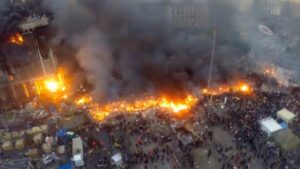
In November 2013, he moved away from a European Union–Ukraine Association Agreement and sought closer economic ties with Russia and the Eurasian Economic Union, which offered Ukraine a better deal. Soon after, the much-hyped Maidan square massive protests erupted and continued into January 2014. The whole process of U.S./neo-Nazi infiltration is very thoroughly described in the documentary “Ukraine on Fire” by well-known U.S. director Oliver Stone. Fascist leaders from the opposition parties Svoboda (All-Ukrainian Union “Freedom”) and Batkivshchyna (All-Ukrainian Union “Fatherland”), as well as U.S. officials such as U.S. Republican Senator John McCain, U.S. Ambassador Geoffrey Pyatt, and U.S. Assistant Secretary of State Victoria Nuland regularly addressed and whipped up the crowd. That is when a telephone conversation between the last two U.S. officials was leaked, in which they were discussing who could replace Yanukovych. One name mentioned was Arseniy Yatsenyuk who did become Ukraine’s interim Prime Minister. The protests became more and more violent and destructive until Yanukovych fled to Russia in February 2014. As early as November 2011, Yanukovych had claimed that “arms are being bought in the country and armed attacks on government agencies are being prepared.” A pro-Western interim president and government was established which signed the EU treaty as early as March 2014. The new president Petro Poroshenko signed the economic part in June 2014, describing it as Ukraine’s “first but most decisive step” towards EU membership.
In March 2014, with its only warm-water, ice-free military port being in Sevastopol, Crimea, Russia took over the peninsula and held a referendum in which the mostly Russian-ethnic population, fearing the neo-Nazi elements in the new Ukrainian regime, as well as an attempt by the Ukrainian parliament to repeal a law that had given Russian the status of a regional language, voted 97.5% to become part of the Russian Federation. Similarly the eastern Ukrainian oblasts (provinces) of Donetsk and Luhansk, mostly inhabited by Russian-ethnic Ukrainians, declared independence and received support from Russia.
Conversely, Nuland herself estimated that “the United States had invested more than 5 billion dollars since 1991 to help Ukraine achieve ‘the future it deserves’”, through the NED, the National Endowment for Democracy, an organization purporting to promote democracy (read: a regime to Washington’s taste) funded by the U.S. Congress via the United States Information Agency (USIA). Until the 2014 coup, the NED had funded 60 projects in Ukraine for the opposition, and its president, Carl Gershman, had called the country “the biggest prize,” as reported by Professor John J. Mearsheimer in Foreign Affairs.
the CIA has been training Ukrainian special forces at a secret facility in the U.S.
Now we learned that, at least since 2015, the CIA “has been training Ukrainian special forces and intelligence officers at a secret facility in the U.S.,” as reported in the Los Angeles Times by Jeff Rogg, a historian of U.S. intelligence and an assistant professor in the Department of Intelligence and Security Studies at the Citadel.
Ever since, fighting has continued between the Ukrainian army and the neo-Nazi batallions, on the one hand, and Russian-backed insurgents in the self-declared Republics of Donetsk and Luhansk in the Eastern Donbas region. In 2019, former comedian Volodymyr Zelenskyy – financed by oligarchs opposed to president Poroshenko – was elected on the promise of cleaning up political corruption (the worst in Europe, most agree). He is fully supportive of membership of both the EU and NATO. And during this invasion, he is asking to become a member of the EU (which has been accepted at press time). This past Sun. Feb. 27, European Commission President Ursula von der Leyen expressed support for Ukraine’s entry to the EU under a simplified, expedited process – after decades of delaying the entry of Turkey and of the Balkan states of Serbia, North Macedonia, and Albania into the Union!
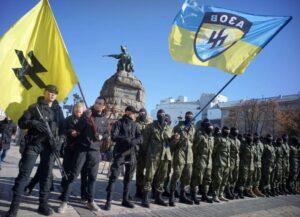
Ever since 2008, when NATO leaders issued a declaration at their Bucharest summit, in Romania, saying that Ukraine and Georgia “will become members of NATO,” Russia has sought commitment from NATO not to proceed and ease its security concerns – this time in writing, not like the oral promises to Gorbachev in 1990, although we have seen the U.S. renege on many treaties, like the nuclear one President Obama signed on to with Iran.
After a flurry of warnings about the danger, you set up a fire then cry for help
Many voices have warned the U.S. and NATO against their aggressive policies, starting with Henry Kissinger, Nixon’s Secretary of State and National Security Advisor. He said back in 2015 that: “All these issues should have been the subject of dialogue with Russia.”
Kissinger too would have wanted Ukraine to be a buffer state, at least neutral. “If Ukraine is to survive and thrive, it must not be either side’s outpost against the other — it should function as a bridge between them” (Russia and the United States). These are exactly the same words that the overthrown president, Yanukovych, had said after his election in 2010.
Most importantly, Kissinger said: “Ukraine has always had a special significance for Russia. It was a mistake not to realize that.” Even John McCain himself, the U.S. Senator in favor of the 2013-14 Maidan protests that ended with the ousting of the constitutionally elected president Yanukovich, had hinted at the risk of U.S. interference in the country that he described as a “crown jewel” for Russia. “There’s no doubt that Ukraine is of vital importance to Putin. I think it was [Henry] Kissinger, I’m not sure, said that Russia, without Ukraine it’s an eastern power, with Ukraine it’s a western power. This is the beginning of Russia, right here in Kiev. So Putin views it as most highly important, and he has put pressure on Ukrainians – the price of energy, different kinds of activities. The word is very clear that he has made certain threats. Whether he would carry them through I don’t know.”
prof. Mearsheimer: the Ukraine Crisis Is the West’s Fault
In a November 2014 interview to the important German magazine Der Spiegel, Kissinger made also clear his take on Crimea: “Crimea is a symptom, not a cause. Furthermore, Crimea is a special case. Ukraine was part of Russia for a long time. You can’t accept the principle that any country can just change the borders and take a province of another country. But if the West is honest with itself, it has to admit that there were mistakes on its side. The annexation of Crimea was not a move toward global conquest. It was not Hitler moving into Czechoslovakia.”
Nor is the current Ukraine invasion. As Israel repeatedly said in 1982 that it did not covet a single inch of Lebanese territory, so does Russia now. Its targets are the regime and NATO.
Another prominent member of the U.S. establishment agrees. When the U.S. Senate approved the first round of NATO expansion in 1998, its well-known diplomat George Kennan, a former U.S. ambassador to Moscow and Belgrade, had said in an interview with the New York Times (he was 94) about NATO encroaching on Ukraine: “I think the Russians will react in a rather negative way, and it will affect their policies […] I think it’s a tragic mistake, there was no reason for that. Nobody threatened anybody… A declining great power with an aging population and a one-dimensional economy did not in fact need to be contained.”
And he added: ”What bothers me is how superficial and ill-informed the whole Senate debate was. I was particularly bothered by the references to Russia as a country dying to attack Western Europe. Don’t people understand? Our differences in the Cold War were with the Soviet Communist regime. And now we are turning our backs on the very people who mounted the greatest bloodless revolution in history to remove that Soviet regime.”
”And Russia’s democracy is as far advanced, if not farther, as any of these countries we’ve just signed up to defend from Russia,” said Mr. Kennan, who joined the State Department in 1926 and was U.S. Ambassador to Moscow in 1952. ”It shows so little understanding of Russian history and Soviet history. Of course there is going to be a bad reaction from Russia, and then [the NATO expanders] will say that we always told you that is how the Russians are — but this is just wrong.”
And that’s what happened 16 years later with Crimea, and now again with the Ukraine: Russia is the aggressor, trumpet the Westerners.
we have neither the resources nor the intention to expand Nato in any serious way
Kennan concludes: “This expansion would make the Founding Fathers of this country turn over in their graves. We have signed up to protect a whole series of countries, even though we have neither the resources nor the intention to do so in any serious way. [NATO expansion] was simply a light-hearted action by a Senate that has no real interest in foreign affairs.”
John J. Mearsheimer is yet another U.S. personality: a professor at the University of Chicago since 1982 after having spent a decade in the U.S. Air Force and the famous United States Military Academy at West Point, and a member of the American Academy of Arts and Sciences with lots of awards. He was opposed to the war against Iraq in 2003, opposed to the denuclearization of Ukraine in 1994 (because it would leave the country vulnerable to Russia), and author of the book “Israel Lobby and U.S. Foreign Policy”.
A few months after the events of 2014, he wrote in Foreign Affairs, the magazine of the very influential Council on Foreign Relations, an article entitled “Why the Ukraine Crisis Is the West’s Fault. The Liberal Delusions That Provoked Putin.”
“Washington may not like Moscow’s position, but it should understand the logic behind it,” Mearsheimer writes. “This is Geopolitics 101: great powers are always sensitive to potential threats near their home territory. After all, the United States does not tolerate distant great powers deploying military forces anywhere in the Western Hemisphere, much less on its borders. Imagine the outrage in Washington if China built an impressive military alliance and tried to include Canada and Mexico in it.”
And Mearsheimer added, in Russia’s eyes, “the EU expansion is a trap to bring in a NATO expansion.”
the U.S. government has a consistent record of destabilizing areas of strategic interest
In a speech to the New York Carnegie Council for Ethics in International Affairs in 2010, Stephen Cohen, professor of Russian studies at Princeton and New York University confirms that for Russia, NATO represents “a broken promise,” “a hypocrisy,” “a lack of confidence,” and “a military encirclement,” in short “an expansion of U.S. influence” to the very borders of Russia, on the former territories of the Soviet Union. This is the state of mind of the Russians when the coup d’état took place in Ukraine in 2014.
In his memoir Duty, Robert M. Gates, who served as Defense Secretary in the administrations of both George W. Bush and Barack Obama, stated his belief that “the relationship with Russia had been badly mismanaged after [George HW] Bush left office in 1993.” Among other missteps, “U.S. agreements with the Romanian and Bulgarian governments to rotate troops through bases in those countries was a needless provocation.” In an implicit rebuke to the younger Bush, Gates asserted that “trying to bring Georgia and Ukraine into NATO was truly overreaching.” That move, he contended, was a case of “recklessly ignoring what the Russians considered their own vital national interests.”
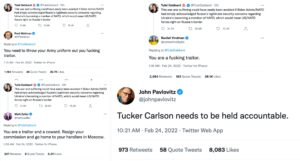
Even England, Germany and France, in a rare show of independence, had blocked the United States and Poland from offering an “assistance plan” from NATO to Ukraine and Georgia at the April 2008 NATO summit in Bucharest, saying that “it would be ‘an unnecessary offense’ to Russia.”
Another well-known U.S. policy critic, the famous U.S. intellectual and former MIT professor Noam Chomsky said: “Crimea is historically Russian with the only Russian port that does not freeze in winter, which is the base of the Russian fleet of great strategic importance.” In an October 2014 interview on U.S. foreign policy for the Plymouth Institute for Peace Studies, Chomsky said: “This is an extremely dangerous situation that has been brewing since Washington broke verbal promises to Gorbachev and began to expand NATO eastward – right to the Russian borders, threatening to add Ukraine to the alliance, which is of great strategic importance to Russia, not to mention their historical and cultural ties.”
Closer to U.S. and to the current administration, Biden’s CIA director, William J. Burns, also Under Secretary and Acting Secretary of State under George W. Bush and Obama, “has been warning about the provocative effect of NATO expansion on Russia since 1995.” When President Bill Clinton’s administration moved to bring Poland, Hungary, and the Czech Republic into NATO, Burns then a political officer in the U.S. Embassy in Moscow, wrote that the decision was “premature at best, and needlessly provocative at worst.”
He continued: “As Russians stewed in their grievance and sense of disadvantage, a gathering storm of ‘stab in the back’ theories slowly swirled, leaving a mark on Russia’s relations with the West that would linger for decades.”
Gorbachev confided that “he would have acted no differently” than Putin
In 2008, Burns, then the U.S. ambassador to Moscow, wrote to Secretary of State Condoleezza Rice: “Ukrainian entry into NATO is the brightest of all redlines for the Russian elite (not just Putin). In more than two and a half years of conversations with key Russian players, from knuckle-draggers in the dark recesses of the Kremlin to Putin’s sharpest liberal critics, I have yet to find anyone who views Ukraine in NATO as anything other than a direct challenge to Russian interests.“
Ronald Suny, Professor of History and Political Science, University of Michigan who quoted Burns, also reported that “In June 1997, 50 prominent foreign policy experts signed an open letter to Clinton, saying, ‘We believe that the current U.S.-led effort to expand NATO … is a policy error of historic proportions’ that would ‘unsettle European stability’.”
But that is precisely the strategy of the U.S. government which offers “the consistent record of destabilizing areas of strategic interest through our involvement,” as expressed by journalist and Rolling Stone contributing editor Matt Taibbi. It is a win-win strategy for the U.S.. Either the enemy does not strike and is then militarily put out of combat, or he strikes and then loses at the economic level. Due to crippling sanctions from the West, the ruble is now in free fall, and Russia is already at risk of a recession.
As Five Colleges professor of Peace and World Security Studies, at the University of Massachusetts Amherst, and defense correspondent of The Nation magazine, Michael Klare says this about the current encirclement of China, “The gigantic 2022 defense bill — passed with overwhelming support from both parties — provides a detailed blueprint for surrounding China with a potentially suffocating network of U.S. bases, military forces, and increasingly militarized partner states. The goal is to enable Washington to barricade that country’s military inside its own territory and potentially cripple its economy in any future crisis. For China’s leaders, who surely can’t tolerate being encircled in such a fashion, it’s an open invitation to… well, there’s no point in not being blunt… fight their way out of confinement.”
“That’s great for defense contractors — and terrible for world peace,” concludes Klare.
This policy is accompanied by the demonization of the enemy, in this case Vladimir Putin, the perfect scapegoat. Even though Burns reported to Washington, in 1995, that “hostility to early NATO expansion is almost universally felt across the domestic political spectrum here [in Russia].”
In 2016, after Russia annexed Crimea, Mark Franchetti of the Sunday Times in London interviewed Mikhail Gorbachev, the last Soviet president, beloved by the West but despised by the Russians who accuse him of selling and squandering their empire. Franchetti was very surprised when Gorbachev confided that “he would have acted no differently” than Putin: “I’m always with the free will of the people and most in Crimea wanted to be reunited with Russia.”
the perennial “fairytale” of “the ultimate evil [russia] confronted by absolute purity and noble idealism [usa]
As former Guardian and Intercept journalist Glenn Greenwald said: “There is a climate of hostility build up since Trump when the U.S. accused Russia of interfering in U.S. elections.” An analysis by MintPress found that, regarding Russia, “90 percent of the opinion pieces in the three major national newspapers have adopted a hawkish militant stance, with a bare scattering of questioning — a familiar phenomenon, as in the days before the Iraq invasion and, in fact, routinely when the state has delivered the word.”
Again, we see the same demonization of another great challenger to the West, Chinese President Xi Jinping. But we do not see attacks against the populist Narendra Modi, India’s prime minister, even though his treatment of Kashmir and of Muslim Indians is more radical and expansive than of the Xinjiang’s Uyghurs by China.

The corollary is that anybody presenting a different view of Russia’s and Putin’s actions is immediately labeled a traitor and “propaganda mouthpiece for Putin.” That was the label applied by Councilwoman Inna Vernikov, a southern Brooklyn Republican born in Ukraine, to New York City Councilwoman Kristin Richardson Jordan (D-Harlem) when the latter dared mention that “NATO broke its promise” by “continuously expanding eastward and threatening Russia by encircling it militarily…. Had Washington and Brussels taken Russia’s security concerns seriously, this war wouldn’t be happening”. Richardson Jordan also said that in 2014 the “U.S. helped overthrow Ukraine’s democratically elected leader in an illegal coup, helped install a fascist government, and empowered a far-right military, all with the goal of destabilizing Russia.”
When Richardson Jordan wrote that: “The U.S. and NATO have a violent history destabilizing the region, such as when it facilitated the breakup of Yugoslavia after bombing Serbia for 78 days,” Councilman Keith Powers instead repeated the U.S. government line: “Our intervention was meant to help prevent one of the largest genocides in modern history.”
As Greenwald wrote, “anyone even slightly off-key or questioning of that script is hunted down and held up as a heretic and traitor,” adding that it’s a challenge to overcome “the inherent constraints of network television — specifically, the demand that all points be made quickly, in three or four minutes between television breaks: i.e., what television news professionals refer to as ‘the need for concision’,” as explained 30 years ago by Noam Chomsky.
The counterpart to demonization is, as Chomsky put it, the perennial “fairytale” of “the ultimate evil confronted by absolute purity and noble idealism,” the U.S. being the pure defender of humanity. Cast aside, or barely mentioned, are the 1989 Panama invasion by 27,684 U.S. troops and over 300 aircraft, and the 1954 Guatemala CIA coup d’état which deposed democratically elected Guatemalan President Jacobo Árbenz – the only two cases presented by the equally virtuous New York Times as “some of the closest analogies” to today’s invasion. To which we must add the most bloody 1973 coup leading to the assassination of president Salvador Allende and the killing of thousands of Chilean leftists; the 1961 Bay of Pigs invasion by U.S. Cuban proxies; the Vietnam war; the terrible damage the U.S.-militarily and financially backed Contras inflicted to Nicaragua in the early 1980s including the 1984 mining of its ports, condemned by the International Court of Justice; the constant vetoing of UN resolutions condemning the illegal Jewish settlements in the West Bank and the whole system of apartheid (while instead Russia supported them); the Iraqi invasion; and of course the 20-year useless Afghan occupation. (This list is very incomplete.)
These are not the refugees we are used to… . These people are intelligent, they are educated people
Instead, even a liberal media like The Week, writes that “For more than 70 years, the United States, through the power of its ideals and ideas — and the threat of overwhelming force — has helped keep the world relatively peaceful and the map’s borders largely in place.” Peaceful! After two Iraq wars, Afghanistan, Iran, and the Yugoslav war, to mention just a few.
But, as Chomsky said, “In the rule-based order, the U.S. sets the rules” and the norms, and the poodles – most of the West – follow with occasional grumbling. Such as when the U.S. unilaterally withdrew from Afghanistan last year without any coordination with its NATO partners, or when Australia cancelled a $90 billion contract for France to construct a fleet of 12 diesel-powered attack submarines, replacing it with U.S. or Britain vessels. A condescending attitude best illustrated by U.S. Assistant Secretary of State Victoria Nuland saying to U.S. Ambassador Geoffrey Pyatt, in the above-mentioned 2014 leaked telephone conversation about Ukraine, “Fuck the EU!” No wonder that Russia refused to talk with France if the U.S. was not involved. Same with the Iran nuclear negotiations. Only the U.S. counts, the EU is just there for the decorum and for the U.S. to pretend it has allies.
Concerning the Ukraine and NATO, the U.S./Western view is that “the Kremlin is supposed to understand and accept that the alliance’s activities, among them war games replete with American tanks staged in nearby Baltic states and rockets stationed in Poland and Romania – which the U.S. says are aimed at Iran [which is 1,400 miles away, while Russia is 300] – in no way present a threat to Russian security.”
* * *
A couple more points…
As Scott Ritter, former U.S. military and UN nuclear inspector in Iraq, pointed out in a recent lengthy and very interesting interview by Washington, D.C.-based U.S. journalist and filmmaker Dan Cohen, Russia is not launching a full-scale and rapid invasion in Ukraine while it could very easily do so. Its army is not opening its way with preparatory fight or heavy artillery. This is a sister country and Russia is only after a hostile regime and NATO. It does not want to destroy the infrastructure nor kill civilians. Very unlike U.S. interventions which begin by carpet bombings. Seumas Milne, son of a former BBC director, and a former journalist with The Guardian and The Economist, executive director of Labor’s strategy and communications under Jeremy Corbyn, recalls Western interventions and relativizes the 2014 events: “the cost in lives of Russia’s arms-length involvement in Ukraine has so far been minimal compared with any significant western intervention you care to think of for decades.”
And he too had warned: “The attempt to lever Kiev into the western camp by ousting an elected leader made conflict certain. It could be a threat to us all… This crisis was triggered by the west’s attempt to pull Ukraine decisively into its orbit and defense structure, via an explicitly anti-Moscow EU association agreement.”
Europe says yes! to white immigrants, and no! to brown or black immigrants
Germany is shedding any pretense, notably under a so-called Socialist chancellor, by taking advantage of the current Ukraine crisis to fully and openly engage in an arms race. After his country being the fourth world exporter of arms, according to a 2019 report by the Stockholm Peace Research Institute, Olaf Scholz is committing to spend at least 2% of the German GDP every year on military build-up, and the entire Bundestag gave him a standing ovation. As an observer said: “It’s great how this pseudo-socialist that everyone saw as a cold fish that no one was going to like, suddenly grasped that he could become a rockstar of western capitalism and pseudo-democracy by a simple act of jingoism.”
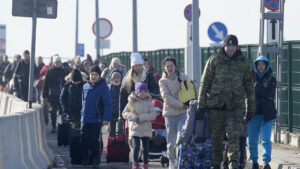
One last (European) hypocrisy, and a major one. While hundreds of thousands of refugees from Ukraine pour into neighboring countries, such as Poland and Hungary, with “some of Europe’s most extreme anti-migration leaders [the change] has been striking — from “We aren’t going to let anyone in” to “We’re letting everyone in,”
“These are not the refugees we are used to… these people are Europeans,” Bulgarian Prime Minister Kiril Petkov told journalists earlier this week, of the Ukrainians. “These people are intelligent, they are educated people…. This is not the refugee wave we have been used to, people we were not sure about their identity, people with unclear pasts, who could have been even terrorists…”
“In other words,” he added, “there is not a single European country now which is afraid of the current wave of refugees.”
And it’s not just politicians. Some journalists are also being criticized for how they are reporting on and describing Ukrainian refugees. “These are prosperous, middle-class people,” an Al Jazeera English television presenter said. “These are not obviously refugees trying to get away from areas in the Middle East… in North Africa. They look like any European family that you would live next door to.”
The channel issued an apology saying the comments were insensitive and irresponsible.
CBS news also apologized after one of its correspondents said the conflict in Kyiv wasn’t “like Iraq or Afghanistan that has seen conflict raging for decades. This is a relatively civilized, relatively European city.”
Worse, “Videos shared on social media posted under the hashtag #AfricansinUkraine allegedly showed African students being held back from boarding trains out of Ukraine, to make space for Ukrainians.”
Lena Karamanidou, an independent migration and asylum researcher in Greece, wrote on Twitter about “the deeply embedded racism of European migration policies.”

